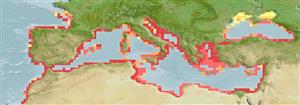Environment: milieu / climate zone / depth range / distribution range
Οικολογία
Θαλασσινό(ά); Υφάλμυρο βενθικό(ς); εύρος βάθους 10 - ? m (Ref. 3573). Subtropical; 47°N - 29°N, 11°W - 42°E
Eastern Atlantic: Mediterranean Sea, the Black Sea, Sea of Azov and Atlantic coasts from Morocco to France. Introduced to Iran and is now naturally occurring in the Caspian Sea basin (Ref. 50218).
Length at first maturity / Μέγεθος / Βάρος / Age
Maturity: Lm 21.3, range 17 - 22 cm
Max length : 40.0 cm SL αρσενικό/απροσδιόριστο; (Ref. 3397); common length : 30.0 cm TL αρσενικό/απροσδιόριστο; (Ref. 9987)
Adults usually in schools inhabit coastal waters (Ref. 3573); sometimes in lagoons and estuaries (Ref. 59043). Juveniles around 2.0 cm SL move to coastal lagoons and estuaries in summer and autumn (Ref. 59043). Adults are herbivorous feeding on algae and vegetal detritus while juveniles feed on zooplankton until about 3 cm SL, then on benthic organisms until 5 cm SL (Ref. 9987, 59043). Reproduce in summer (Ref. 2804). Oviparous, eggs are pelagic and non-adhesive (Ref. 205). Utilized for roe, but also fresh, smoked and frozen (Ref. 9987).
Thomson, J.M., 1986. Mugilidae. p. 344-349. In J. Daget, J.-P. Gosse and D.F.E. Thys van den Audenaerde (eds.) Check-list of the freshwater fishes of Africa (CLOFFA). ISNB, Brussels, MRAC; Tervuren; and ORSTOM, Paris. Vol. 2. (Ref. 3573)
IUCN Red List Status (Ref. 130435)
Threat to humans
Harmless
Human uses
αλιεία: περιορισμένης εμπορικότητας; Υδατοκαλλιέργειες: Εμπορικό(ά)
Εργαλεία
Special reports
Download XML
Διαδικτυακές πηγές
Estimates based on models
Preferred temperature (Ref.
123201): 14.4 - 21.5, mean 18.4 °C (based on 154 cells).
Phylogenetic diversity index (Ref.
82804): PD
50 = 0.5005 [Uniqueness, from 0.5 = low to 2.0 = high].
Bayesian length-weight: a=0.01072 (0.00899 - 0.01277), b=2.96 (2.93 - 2.99), in cm total length, based on LWR estimates for this species (Ref.
93245).
Τροφικό Επίπεδο (Ref.
69278): 2.9 ±0.38 se; based on food items.
Generation time: 4.2 (3.4 - 5.5) years. Estimated as median ln(3)/K based on 12
growth studies.
Ελαστικότητα (Ref.
120179): Μεσαίο(α), ελάχιστος χρόνος για διπλασιασμό πληθυσμού 1,4 - 4,4 έτη (K=0.2-0.3; tm=3-4).
Fishing Vulnerability (Ref.
59153): Moderate to high vulnerability (45 of 100).
Climate Vulnerability (Ref.
125649): Moderate vulnerability (39 of 100).
Nutrients (Ref.
124155): Calcium = 51.7 [14.1, 292.9] mg/100g; Iron = 0.722 [0.360, 1.278] mg/100g; Protein = 18.4 [17.0, 20.0] %; Omega3 = 0.73 [0.33, 1.67] g/100g; Selenium = 6.96 [2.86, 17.33] μg/100g; VitaminA = 12.3 [3.7, 38.5] μg/100g; Zinc = 0.621 [0.386, 0.987] mg/100g (wet weight); based on
nutrient studies.
